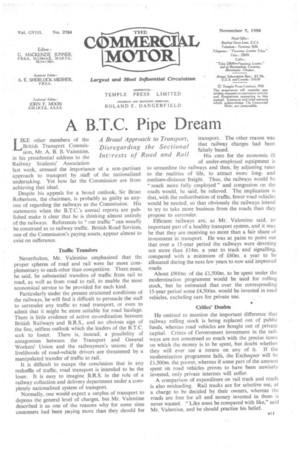A B.T.C. Pipe Dream
Page 45

If you've noticed an error in this article please click here to report it so we can fix it.
liKE other members of the British Transport Commission, Mr. A. B. B. Valentine, in his presidential address to the Railway Students' Association last week, stressed the importance of a non-partisan approach to transport by staff of the nationalized undertaking. Yet how far the Commission are from achieving that ideal.
Despite his appeals for a broad outlook, Sir Brian -Robertson, the chairman, is probably as guilty as anyone of regarding the railways as the Commission. His statements when the B.T.C.'s annual reports are published make it clear that he is thinking almost entirely of the railways. References to "our traffic" can usually be construed as to railway traffic. British Road Services, one of the Commission's paying assets, appear almost to exist on sufferance.
Traffic Transfers Nevertheless, Mr. Valentine emphasized that the proper spheres of road and rail were far more complementary to each other than competitive. There must, he said, be substantial transfers of traffic from rail to road, as well as from road to rail, to enable the most economical service to be provided for each kind.
Particularly under the present straitened conditions of the railways, he will find it difficult to persuade the staff to surrender any traffic to road transport, or even to admit that it might be more suitable for, road haulage. There is little evidence of active co-ordination between British Railways and B.R.S., and no obvious sign of the fine, selfless outlook which the leaders of the B.T.C. seek to foster. There is, instead, a possibility of antagonism between the Transport and General Workers' Union and the railwaymen's unions if the livelihoods of road-vehicle drivers are threatened by a manipulated transfer of traffic to rail.
It is difficult to escape the conclusion that in any reshuffle of traffic, road transport is intended to be the loser. It is easy to imagine B.R.S. in the role of a railway collection and delivery department under a completely nationalized system of transport.
Normally, one would expect a surplus of transport to depress the general level of charges, but Mr. Valentine described it as one of the reasons why for some time customers had been paying more than they should for transport. The other reason was that railway charges had been falsely based.
His cure for the economic ill of under-employed equipment is to streamline the railways and then, by adjusting rates to the realities of life, to attract more longand medium-distance freight. Thus, the railways would be "much more fully employed" and congestion on the roads would, he said, be relieved. The implication is that, with the redistribution of traffic, fewer road vehicles would be needed, so that obviously the railways intend to try to take more business from the roads than they propose to surrender.
Efficient railways are, as Mr. Valentine said, an important part of a healthy transport system, and it may be that they are receiving no more than a fair share of investment in transport. He was at pains to point out that over a 15-year period the railways were devoting not more than £14m. a year to track and signalling, compared with a minimum of £60m. a year to be allocated during the next few years to new and improved roads.
About £900m. of the £1,500m. to be spent under the modernization programme would be used for rolling stock, but he estimated that over the corresponding 15-year period some £4,500m. would be invested in road vehicles, excluding cars for private use.
Critics' Doubts He omitted to mention the important difference that railway rolling stock is being replaced out of public funds, whereas road vehicles are bought out of private capital. Critics of Government investment in the railways are not concerned so much with the precise items on which the money is to be spent, but doubt whether they will ever see a return on any of it. If the modernization programme fails, the Exchequer will be £1,500m. the poorer, whereas if some part of the amount spent oh road vehicles proves to have been unwisely invested, only private interests will suffer.
A comparison of expenditure on rail track and roads is also misleading. Rail tracks are for selective use, at a charge to be decided by their owners, whereas the roads are free for all and money invested in them is never wasted. "Like must be compared with like," said Mr. Valentine, and he should practise his belief.












































































































































